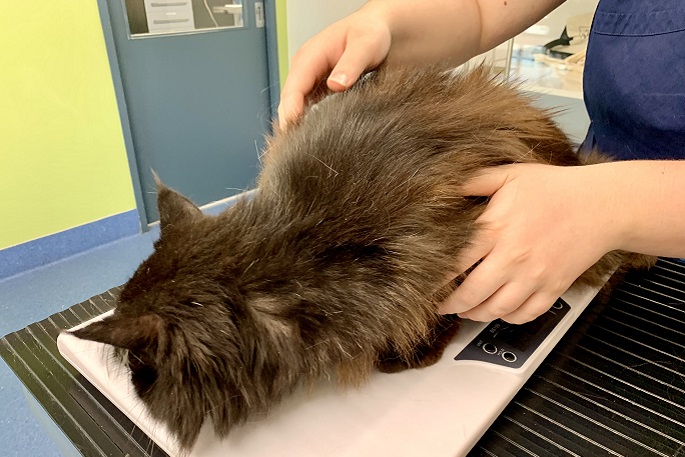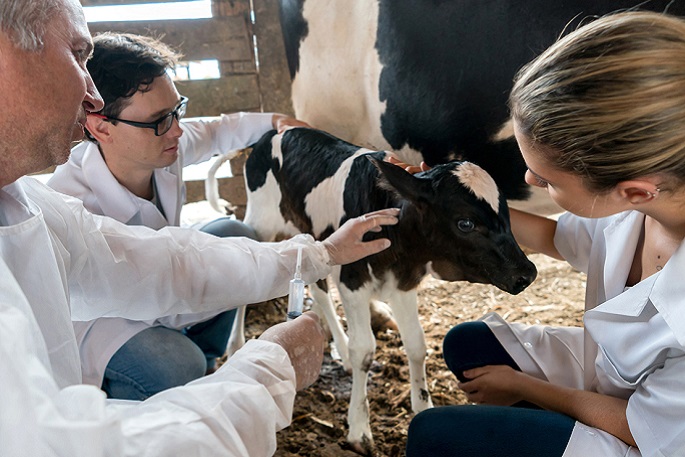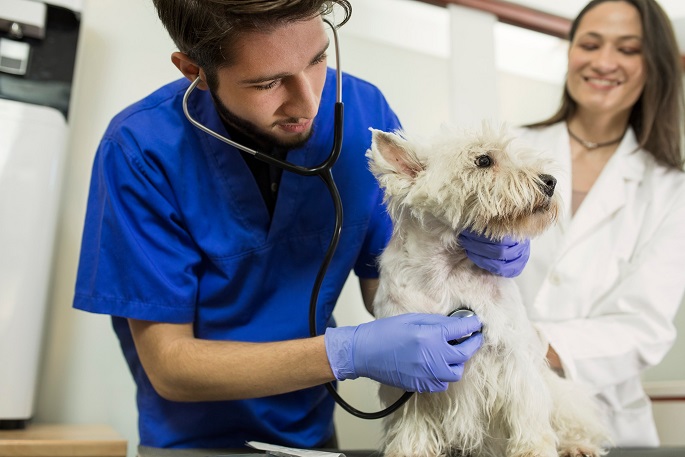Posted: 03:00pm Sat 27 Apr, 2024
Celebrating World Veterinary Day

Arthur the chinchilla persian cat being weighed at Koru Vets. Photo: Rosalie Liddle Crawford.
From treating and caring for our animals and working on the front lines of disease prevention, to monitoring animal welfare and biosecurity on a national scale, New Zealand’s veterinarians are part of an essential workforce.
To mark World Veterinary Day today, Saturday, April 27 the New Zealand Veterinary Association Te Pae Kīrehe is celebrating the country’s veterinarians and the important role they play across the globe in keeping both animals and humans safe.
This year’s theme for World Veterinary Day is: Veterinarians are essential health workers.
NZVA CEO Kevin Bryant says the veterinary workforce encompasses a wide range of roles, including government advisors.
"Veterinarians play a huge role in our daily lives, so it’s a great opportunity to let them know how much we value their work," says Kevin.
"Not only are they the people we call when our animals are unwell, but they help ensure the ongoing welfare of animals; they ensure the safety of our food chain; identify and research diseases that can be transferred from animals to humans; and help manage and prevent serious outbreaks."

Veterinarians at work. Photo: NZVA.
The essential role veterinarians play in the communities they live and work is also evident in the long list of achievements by New Zealand’s veterinarians and the wider profession.
Veterinarians have recently been recognised across a variety of fields, such as receiving New Zealand Royal Honours, winning Young Farmer of the Year, being presented with university medals, winning national awards, and much more.
It was also recently announced the subject of Veterinary Science at Te Kunenga ki Pūrehuroa Massey University had risen in the Quacquarelli Symonds (QS) Subject Rankings to 21st globally and first in Australasia.
The World Veterinary Association says that not only does veterinary science contribute to animal health and wellbeing, but also to the physical, mental, and social wellbeing of humans.
All New Zealand veterinarians have had training in identifying, treating, and managing zoonoses - the diseases that can transfer from animals to humans - and their relationship to public health.
This important work was demonstrated during the Cyclone Gabrielle response when the veterinary profession worked alongside General Practitioners to manage the impact of leptospirosis.
They also ensured essential supplies and services were provided to isolated farms; treated animals on site; and safely accommodated lost pets in clinics.

Veterinarians at work. Photo: NZVA.
A global shortage of veterinarians has impacted New Zealand’s veterinary workforce in recent years, which has meant clinics have had to implement some changes.
Kevin says the public can support veterinary teams by showing respect to vet staff; remaining patient if they have to wait slightly longer than usual for their animal to be seen; and to keep veterinary emergency services for emergencies only.
"Veterinarians are hard-working, dedicated professionals who provide an essential service and want the best for your animals," says Kevin.
"There is still a vet shortage in New Zealand that we are navigating. To help overcome these challenges, the NZVA is focused on supporting long-term investment in people and building capacity within teams."
With this in mind, animal owners are urged to ‘Think P.E.T’ if their pet is sick or hurt, so very sick animals can receive the treatment they need quickly, and vet teams are not overwhelmed.
This approach keeps veterinary emergency services for emergencies only and means veterinarians can focus on the patients that need it most.
P.E.T stands for:
- Pause. Think for a moment about whether your pet needs emergency care or could be seen by their vet during normal business hours.
- Emergency call. Phone your vet if you think your pet needs emergency care or you’re unsure.
- Take. Follow the advice you receive to either take your pet to an emergency service provider, or book an appointment during normal business hours.
To help keep your pets happy and healthy, keep up-to-date with routine vaccinations; plan daytime appointments wherever possible; provide plenty of shade and shelter for your animals; and ensure pets are safe and secure while at home and out in the community.
For more information about the campaign, visit nzva.org.nz/emergencycare


0 comments
Leave a Comment
You must be logged in to make a comment.